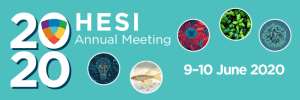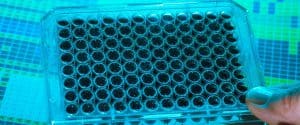2020 HESI Annual Meeting Virtual Sessions

In response to the COVID-19 pandemic, HESI successfully held its first-ever virtual Annual Meeting earlier this month. Nearly 200 attendees tuned in as speakers discussed implementing artificial intelligence approaches to improve human and environmental health protection as well as new scientific programming at HESI. The Annual Meeting included featured presentations by Dr. Thomas Miller (Brunel University London), Prof. Jackie Hunter (BenevolentAI), and Dr. Cynthia Rider (National Toxicology Program). We thank those of you who were able to join us for the 2020 HESI Annual Meeting virtual sessions to support science for a safer, more sustainable world.
If you were unable to attend the HESI Annual Meeting virtual sessions and would like to learn more about new scientific programming at HESI, click here.
NeuTox Committee Explores Noninvasive Biomarkers

The Translational Biomarkers of Neurotoxicity (NeuTox) Committee recently convened for a mid-year update. The committee was formed out of an Emerging Issues Proposal in 2013 and has evolved over the years to include two main projects to explore noninvasive biomarkers of neurotoxicity. To date, the committee has completed a pilot study and published four peer-reviewed papers detailing results of the promising imaging and fluidic biomarkers of neurotoxicity. A phase 2 study is planned in the coming months and endpoints will include biomarkers such as GFAP, UCHL-1, neurofilament light, metabolomics, and more. The focus of the second projects is on using microelectrode array (MEA) technology to predict compounds that may cause seizure. The use of MEA offers the first in vitro assay detection of seizurogenic compounds. A pilot study was recently completed with 12 compounds, 13 sites, and two cell models. View the full mid-year update here.
Learn more or join the committee by contacting Jennifer Pierson (jpierson@hesiglobal.org).
Botanical Safety Consortium
Annual Meeting

The first annual Botanical Safety Consortium (BSC) meeting was held on 29 May 2020 in a virtual format. Through a half day of talks, the meeting aimed to provide information on the structure, mission, objectives, and strategy of the BSC, as well as share an overview of the current technical working group plans, recruit new members, and solicit input into current scientific challenges and opportunities related to botanical dietary supplement safety. The meeting was a virtual event in which over 330 people participated, and the recording and slides are available on the BSC website.
More information about the BSC can be found at botanicalsafetyconsortium.org or by contacting Connie Mitchell (cmitchell@hesiglobal.org) and Michelle Embry (membry@hesiglobal.org).
eSTAR Committee Webinar Series

The eSTAR Committee is hosting an annual webinar series featuring talks from members and/or invited speakers on scientific areas of relevance to toxicology risk assessment. These talks will be held on a quarterly basis and will serve as an opportunity to convene the eSTAR Committee members and network as well as showcase new methods and innovative approaches to risk assessment. In addition, as an outreach initiative, the eSTAR Committee members are encouraged to invite colleagues or interested scientists to attend the webinar series and learn more about HESI projects.
On 26 May 2020, the committee kick-started the 2020 eSTAR Webinar Series. During the initial webinar, Dr. Leah Wehmas took attendees through some of the history and achievements of the FFPE WG project. Her talk was titled “Genomics in formalin-fixed paraffin embedded tissue (FFPE) samples for quantitative risk assessment”.
To view the full recording of the initial webinar, click here.
From the Leadership

These past few months amidst the COVID-19 pandemic have been filled with a great deal of loss and challenge, but also opportunities to be more intentional in our connections and activities. The need for collaborative, innovative, efficient, and impactful health protection science has never been more important. HESI’s decades of experience in the leadership of ‘virtual’ scientific teams provides us with opportunities – and in my opinion, obligations – to leverage this experience to support current global health challenges. We also have decades of relevant experience in the fields of therapeutic safety, vaccine safety, diagnostic/biomarker testing, and risk assessment. In just the past few months, HESI has built international teams to explore the reproducibility and robustness of a rapid testing method for SARS-CoV-2 in resource-limited settings and is exploring opportunities to provide novel mechanistic safety data on potential COVID-19 therapeutics. These are relatively small steps, but as scientists committed to public health, we will continue to push forward.
I also hope we will seize this moment to push HESI forward as well. To fully realize our mission, we must broaden our consideration of how social determinants of health and resource equity factor into our approaches to safety, risk assessment, and health protection as they are applied around the globe. Will you join us in this goal?

Syril D. Pettit, DrPH, MEM
HESI Executive Director